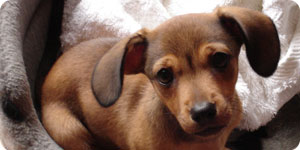
When a baby develops the ability to crawl and explore a house, we naturally baby-proof the house to keep the curious youngster out of harm’s way. The same should be done for a puppy in a new home, but a puppy can do far more damage to your belongings than a baby ever could. Puppy-proofing your house ensures that both your puppy and your belongings stay safe during this early stage when it’s only natural for the inquisitive puppy to explore and play.
- Chewing. During your puppy’s first year, teething will occur, causing the pup to chew vigorously on everything possible. This means everything from toilet paper to furniture legs, cords (which can electrocute your dog) and plastic (remote controls, combs). Preventative measures will depend on the size and jumping ability of your puppy, but you must go through every room that your puppy can access, removing anything of value that could be chewed. For furniture that can’t be moved, you can also use a chew-repellent spray that isn’t toxic to your puppy. Talk to your vet about the use of these sprays, which can be found and purchased online.
- Not just chewing, but eating as well! That’s right, puppy-proofing a house doesn’t stop with just chew-proofing it. Your puppy will explore by sniffing, chewing and eating. You might not care if your puppy chews up a certain rug, but it’s possible that the fibers of the rug could cause health and digestive problems and shouldn’t be consumed. A houseplant might be dying anyway, but letting your puppy eat it would be irresponsible until you know for a fact that it isn’t toxic. You must think not only about physical damage to property when you puppy-proof a house, but also about the puppy’s wellbeing. Are there sharp little things like thumbtacks and staples lying around, or even small nails? Any shiny objects like jewelry? Puppies can chew on and eat little pieces of children’s toys. They’ve been known to eat candy wrappers, wood chips, anything children sometimes eat (crayons, glue), and many things even kids probably wouldn’t eat (toiletries, money).
When it comes to bad things puppies can ingest, the list is extensive. In order to puppy-proof your house, you must approach every room of your house with a combination of total innocence and curiosity. Lock away all poisons and cleaning agents. Don’t leave pills and medication lying around. If it’s small enough for a puppy to swallow, consider putting it somewhere safe from the puppy.
- Not just chewing and eating, but pulling. Puppies don’t just chew on cords; they pull on them, too. If you have a lamp or some kind of electronic device with a cord that stretches into the puppy’s reach, consider it fair play for the puppy to pull and knock down. Once again, this can mean damage to your property, but more importantly the heavy object could hurt your puppy if it were to fall. Pets are fascinated by dangling objects, so puppy-proof your house by keeping all electrical cords out of the way. During holidays, when special decorations are draped and hung all over the place, the same precautions should be taken.
- Fence it off if it’s too dangerous. If there’s a room that’s too dangerous for the puppy to enter (often it’s a utility room or garage where all of the household cleaners and automotive substances are kept), use a baby-fence to keep your puppy out of there. Remember that your puppy might be able to jump.
- Garbage everywhere! If they’re big enough to accomplish this, puppies won’t hesitate to knock over a garbage can or drag a garbage bag into the middle of a room. They’ll tear through the trash with feral glee and leave an enormous mess, if given this opportunity. And worst of all, they could consume something bad for them, like coffee grounds or candy bar wrappers. Keep the garbage always inside a cupboard or somewhere that the puppy can’t go.
- Defend your small furry friends. If you have small rodent pets, you’ll have to protect them from the rambunctious young puppy.
- Give a dog a bone? Giving your begging puppy a bone from dinner can necessitate emergency surgery to remove the bone shards that get stuck in the puppy’s digestive system. Don’t give your dogs any bone scraps from dinner; they can easily splinter.
- Dogpaddling. You might remember seeing dogs swim ably in movies, but not all puppies can keep from drowning. Puppy-proofing your house means that any deep water, whether swimming pool or whirlpool, should be kept off-limits for a puppy.
Watch your puppy’s behavior – be there to observe his actions and proclivities. That will help you determine where to focus your puppy-proofing energies, but don’t neglect any of the advice above. And remember that a puppy can behave differently when you’re not around! If you think like a puppy when you puppy-proof your house, you’ll help to ensure that your companion’s youthful years are healthy and joyful.
